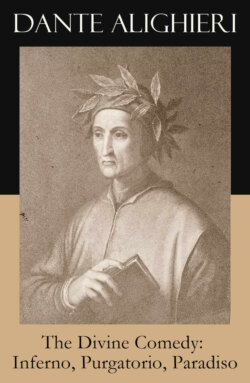Читать книгу The Divine Comedy: Inferno, Purgatorio, Paradiso (3 Classic Unabridged Translations in one eBook: Cary's + Longfellow's + Norton's Translation + Original Illustrations by Gustave Doré) - Dante Alighieri - Страница 60
На сайте Литреса книга снята с продажи.
CANTO XV
ОглавлениеAs much as 'twixt the third hour's close and dawn,
Appeareth of heav'n's sphere, that ever whirls
As restless as an infant in his play,
So much appear'd remaining to the sun
Of his slope journey towards the western goal.
Evening was there, and here the noon of night;
and full upon our forehead smote the beams.
For round the mountain, circling, so our path
Had led us, that toward the sun-set now
Direct we journey'd: when I felt a weight
Of more exceeding splendour, than before,
Press on my front. The cause unknown, amaze
Possess'd me, and both hands against my brow
Lifting, I interpos'd them, as a screen,
That of its gorgeous superflux of light
Clipp'd the diminish'd orb. As when the ray,
Striking On water or the surface clear
Of mirror, leaps unto the opposite part,
Ascending at a glance, e'en as it fell,
(And so much differs from the stone, that falls)
Through equal space, as practice skill hath shown;
Thus with refracted light before me seemed
The ground there smitten; whence in sudden haste
My sight recoil'd. "What is this, sire belov'd!
'Gainst which I strive to shield the sight in vain?"
Cried I, "and which towards us moving seems?"
"Marvel not, if the family of heav'n,"
He answer'd, "yet with dazzling radiance dim
Thy sense it is a messenger who comes,
Inviting man's ascent. Such sights ere long,
Not grievous, shall impart to thee delight,
As thy perception is by nature wrought
Up to their pitch." The blessed angel, soon
As we had reach'd him, hail'd us with glad voice:
"Here enter on a ladder far less steep
Than ye have yet encounter'd." We forthwith
Ascending, heard behind us chanted sweet,
"Blessed the merciful," and "happy thou!
That conquer'st." Lonely each, my guide and I
Pursued our upward way; and as we went,
Some profit from his words I hop'd to win,
And thus of him inquiring, fram'd my speech:
"What meant Romagna's spirit, when he spake
Of bliss exclusive with no partner shar'd?"
He straight replied: "No wonder, since he knows,
What sorrow waits on his own worst defect,
If he chide others, that they less may mourn.
Because ye point your wishes at a mark,
Where, by communion of possessors, part
Is lessen'd, envy bloweth up the sighs of men.
No fear of that might touch ye, if the love
Of higher sphere exalted your desire.
For there, by how much more they call it ours,
So much propriety of each in good
Increases more, and heighten'd charity
Wraps that fair cloister in a brighter flame."
"Now lack I satisfaction more," said I,
"Than if thou hadst been silent at the first,
And doubt more gathers on my lab'ring thought.
How can it chance, that good distributed,
The many, that possess it, makes more rich,
Than if 't were shar'd by few?" He answering thus:
"Thy mind, reverting still to things of earth,
Strikes darkness from true light. The highest good
Unlimited, ineffable, doth so speed
To love, as beam to lucid body darts,
Giving as much of ardour as it finds.
The sempiternal effluence streams abroad
Spreading, wherever charity extends.
So that the more aspirants to that bliss
Are multiplied, more good is there to love,
And more is lov'd; as mirrors, that reflect,
Each unto other, propagated light.
If these my words avail not to allay
Thy thirsting, Beatrice thou shalt see,
Who of this want, and of all else thou hast,
Shall rid thee to the full. Provide but thou
That from thy temples may be soon eras'd,
E'en as the two already, those five scars,
That when they pain thee worst, then kindliest heal,"
"Thou," I had said, "content'st me," when I saw
The other round was gain'd, and wond'ring eyes
Did keep me mute. There suddenly I seem'd
By an ecstatic vision wrapt away;
And in a temple saw, methought, a crowd
Of many persons; and at th' entrance stood
A dame, whose sweet demeanour did express
A mother's love, who said, "Child! why hast thou
Dealt with us thus? Behold thy sire and I
Sorrowing have sought thee;" and so held her peace,
And straight the vision fled. A female next
Appear'd before me, down whose visage cours'd
Those waters, that grief forces out from one
By deep resentment stung, who seem'd to say:
"If thou, Pisistratus, be lord indeed
Over this city, nam'd with such debate
Of adverse gods, and whence each science sparkles,
Avenge thee of those arms, whose bold embrace
Hath clasp'd our daughter; "and to fuel, meseem'd,
Benign and meek, with visage undisturb'd,
Her sovran spake: "How shall we those requite,
Who wish us evil, if we thus condemn
The man that loves us?" After that I saw
A multitude, in fury burning, slay
With stones a stripling youth, and shout amain
"Destroy, destroy!" and him I saw, who bow'd
Heavy with death unto the ground, yet made
His eyes, unfolded upward, gates to heav'n,
